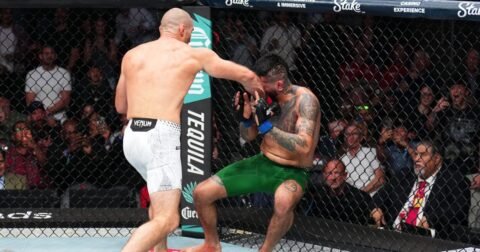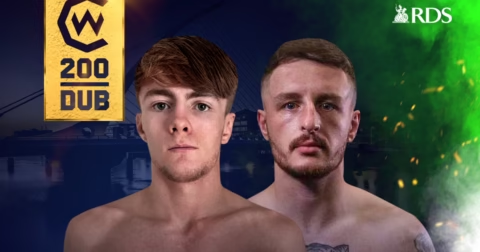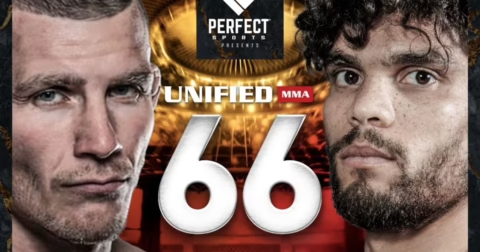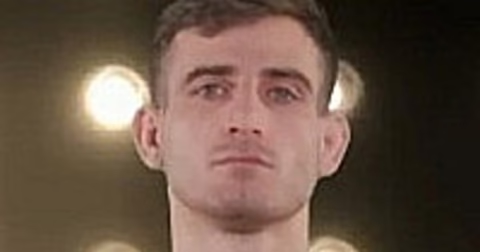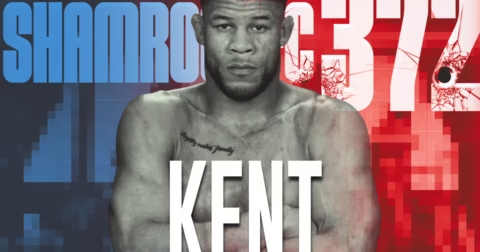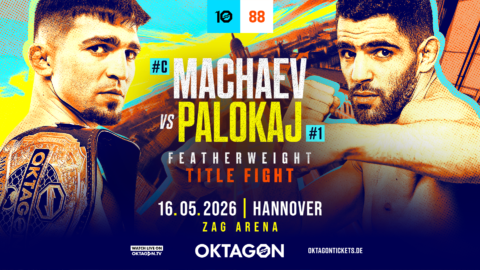Back in 2008, following a loss to then WBC & WBO Middleweight Champion Kelly Pavlik, Cwmbran power puncher Gary Locket hung up his ring gloves, admitting he was “never a real lover of boxing”.
But more than a decade later, ‘The Rocket’ is yet to relinquish the mantle, imparting his years of wisdom on the next crop of ambitious pugilists. While he’s still most revered for his work within the ring, the poker-faced 43 year old also has a firm hand in the simmering Welsh MMA scene and delivers striking insight to a catalogue of contenders including UFC bantamweight Jack ‘Tank’ Shore (13-0-0), Bellator’s Lewis Long (17-6-0) and rising Cage Warriors prospect Oban Elliot (3-0-0). Unsurprisingly his influence has made an immediate impact, making him one of The Principality’s most sought after striking coaches.
MMA UK: Following your 2008 world title loss to Kelly Pavlik, you admitted you were never a real lover of boxing. What kept you coming back all this time?
GL: There’s a lot of politics with boxing isn’t there? There’s lots of things that can upset you, lots of goings-on that can really turn your head and make you fall out of love with the sport. I think I fell out with the sport maybe 2002-2003. (There were) fight’s I should’ve got that I never got, promises that were made that never came through. So, you fall out of love but you keep your hand in because, obviously, I was good at it and I was a natural puncher so I always got results. And I earned pretty well, even in the non-title fights. In the end, I got a little bit out of it when I won the WBU which was, don’t get me wrong when you look back, it was a nothing title. It was like how the IBO is rated now. But those WBU fights were quite big money fights. I was earning 25-35 (thousand) for them.
MMA UK: How did you initially get involved in MMA?
GARY LOCKETT: Many moons ago I was coaching in a gym in Pontyclun called Fight Academy Wales and I noticed Lewis Long, who’s now with Bellator, looking keen after I did a session with one of his friends. His friend said, “You need to go with Gary because you’ll learn so much just in one session”. So Lewis tried it out and that was it! I think Lew and myself have been working together for about 7-8 years now.
MMA UK: Did you follow MMA on TV beforehand?
GL: Not really, I mean I watched the original UFC’s, the first, second and third with Royce Gracie and got quite into The Ultimate Fighter back in about 2004-2005. People like Caol Uno, Matt Hughes, all those kinda guys. Randy Couture! I read Chuck Lidell’s book, so I’ve been there or thereabouts but I don’t follow it wholeheartedly like an MMA enthusiast would.
MMA UK: Did you have a favourite fighter or anyone you particularly admired?
GL: I think there’s quite a few, I mean Fedor was an absolute beast, wasn’t he? But he just seemed to go past it overnight. I really used to like Matt Hughes but there are so many good ones around now.
MMA UK: You’ve said before how you were left waiting by the phone a lot in your career, that fight’s you deserved didn’t come your way. It’s quite a common criticism in boxing. How do you think the UFC’s system of unified rankings and authoritarian swing in matchmaking would have affected your career had it been applied to boxing at the time you were fighting? Do you like boxing’s free-market system?
GL: I think the system in boxing allows for a lot more champions. If that (the UFC’s) system had been the same with me, I would’ve never fought for a world title. That’s just being realistic. People say that’s being painfully truthful but I’m a realist. I was a European class fighter, with good power, maybe world-class power but my overall skills weren’t as good. I think it would’ve affected me in a big way probably. Being a big puncher would’ve probably taken me somewhere though.
MMA UK: One of the other notable boxing trainers to step over into MMA is former Manny Pacquiao coach Freddie Roach. When prompted in an interview in the run-up to George St-Pierre’s title win over Michael Bisping in 2017, Roach said he believed boxing promoters had ‘lost sight of entertaining the people’. Do you agree with that statement?
GL: I think he’s probably hit the nail on the head. The undercard often gets rushed. It’s not matchmaking anymore, especially in Britain. Say I request a southpaw (opponent) to see how my fighter gets on, then I might want someone who’s tough but ambitious, maybe one who’s lost a couple of times so they’re past it – that’s matchmaking! But just grabbing such and such who’s lost 100 times, that’s not matchmaking, that’s a booking agent! The matchmaking has gone out of the sport.
MMA UK: Aside from boxing you’ve acted as a personal trainer and now as a striking coach in MMA. To what extent is your enthusiasm for coaching driven by developing individuals as opposed to a love for the sport itself?
GL: It’s given me an added enthusiasm I’d say. For instance, when I went down to Copenhagen and I worked Jack Shore’s corner, I could see his dad ‘Shakey’ (Richard Shore) and his second coach Carl Parker, both rated me. They value me, they value my input. In boxing obviously my input is valued but to have my input valued in a different sport is especially rewarding for me, I really enjoy it.
Why they’d want me working in the corner I really don’t know because a lot of the time I don’t really know what’s going on. I mean, I know what’s going on but I don’t know what to say when it comes down to Brazilian Jiu-Jitsu, wrestling, judo, kickboxing, etc. But in the Copenhagen fight, there was actually a point at the end of the second round where I had some input. It was just a common-sense issue really but they said on the commentary “really good corner work and really good advice from Jack’s corner”. That was my advice.
Jack has a very, very good stand up style. He has a really good jab, really good judgement of distance. He was out-jabbing a guy who was known as a striker but, the minute Jack let him come within arms distance, he (Shore) started swinging and he got clipped. You saw Jack’s leg go a little bit. He said he went over on his ankle but, at the time, I just thought he’d been wobbled. I basically said, ‘Don’t let him force you into swinging, keep him at distance, keep him at the end of your jab and when you get close don’t start swinging, you’re better off covering up because that’s his only chance of catching you!’
It’s a really, really great sport to be involved in. The organisation at these promotions is second to none, it knocks spots off boxing! I think boxing could really take a leaf out of MMA’s book when it comes to organisation and planning.
MMA UK: What are the immediate difficulties you’ve encountered when training an MMA fighter as opposed to a traditional boxer?
GL: I supposed I doubted myself a little bit in the beginning. Specifically, as a boxing coach, you don’t know if certain things you’re teaching them is actually going to be detrimental to them inside the octagon. Will it put them in a position where they get taken down? Will it put them in a position where they are vulnerable to other martial arts techniques? I think that’s for them (the other trainers) to work out but also for me to learn as well. The more I’ve learnt, the more I’ll understand what to avoid for fear of being taken down etc.
MMA UK: Is it as much of a learning experience for you as it is for the fighters?
GL: They’re learning a new art, aren’t they? It’ll be more of a learning experience for them. For me, the more MMA I watch, the more ideas I get of what’s good and what’s bad to teach. I wouldn’t say it’s as much of a learning experience for me but I definitely have to learn as well to be a better MMA striking coach.
MMA UK: In 2002 you attributed much of your first professional loss to Yuri Tsarenka to a lack of proper nutrition and the struggles with cutting weight. What do you think of huge weight gaps between divisions in MMA? Does it make for better divisions or is it a detriment to combat sports?
GL: It has its advantages and its disadvantages. It provides for really exciting fights but also you get guys who are stuck between weights like Lewis Long who’s too big for 155 (lb) but probably too small for 170. He’d be best off around 159/160. He’s said before how he just can’t do it, he said: “I can make it but I can’t be strong the next day”. If I had known then what I know now, I would’ve made light-middleweight comfortably. Even though it was only 12 years ago when I retired when you look at the level of the different things that are around now, the advice with the nutrition is far, far different to the way it was back then. Even things like meal prep companies, if I’d have had one of them looking after me, putting all the proper macros into my food I never would’ve had a problem. But I used to do it the old fashion way, I used to starve myself then I’d go out and do a run in the night after being knackered from the session in the day, all without the proper nutrition to recover. It was a knock-on effect. Nutrition is so much more advanced now than what it was 15-20 years ago.
MMA UK: What boxers do you think have the attributes to do well in MMA?
GL: It’s something I’ve never really thought of. I mean you have a different breed of boxers these days. You have boxers who have university degrees, boxers who are quite switched on. I like to think of myself as pretty switched on. I think the guys who are more streetwise, who have come from rough areas, that are fighting every day, perhaps they got expelled from school, maybe those kinda guys but that’s just a guess.
In Part Two to follow,……


